Key takeaways:
- Perfectionism in children can lead to feelings of inadequacy, anxiety, and depression, affecting their mental and physical health.
- Signs of perfectionism include excessive fear of mistakes, intense reactions to feedback, and an inability to enjoy accomplishments.
- Encouraging a growth mindset and creating a supportive environment are essential strategies for helping children manage perfectionism.
- Modeling vulnerability and sharing personal experiences with imperfection can foster open communication and resilience in children.
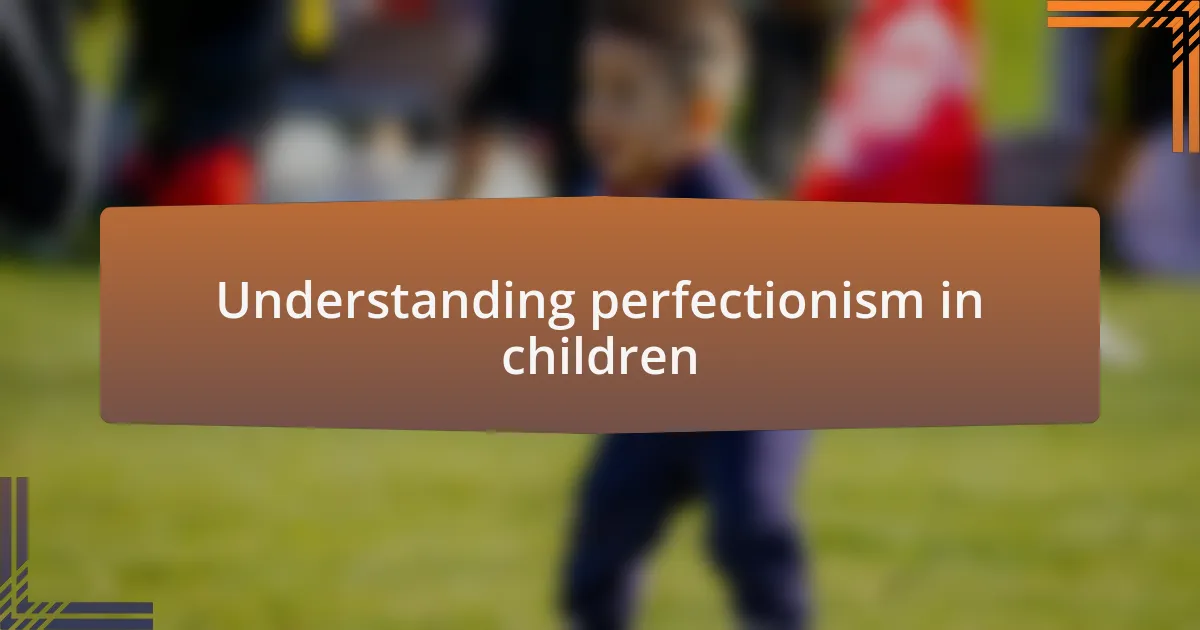
Understanding perfectionism in children
Perfectionism in children often manifests as an intense fear of making mistakes. I remember a moment when my son, who was just eight at the time, cried after receiving a B+ on his test. It was heartbreaking to see him equate his self-worth with a grade, and it made me wonder how many kids silently struggle under similar pressures.
One of the toughest aspects of perfectionism is that it can create a constant sense of dissatisfaction. I once overheard a friend’s daughter, an aspiring musician, practice a single measure of a song for hours, convinced it wasn’t “good enough.” This relentless pursuit not only stifles her creativity but also dims the joy she once found in music. How can we help our children see that imperfections can lead to learning and growth?
Additionally, perfectionism can stem from various influences, including parents, peers, and societal expectations. It was illuminating to realize that kids often feel their parents’ unspoken pressure to excel. I often find myself reflecting on how my own reactions to my children’s achievements might inadvertently shape their views on success. Are we fostering a dialog that values effort over perfection?
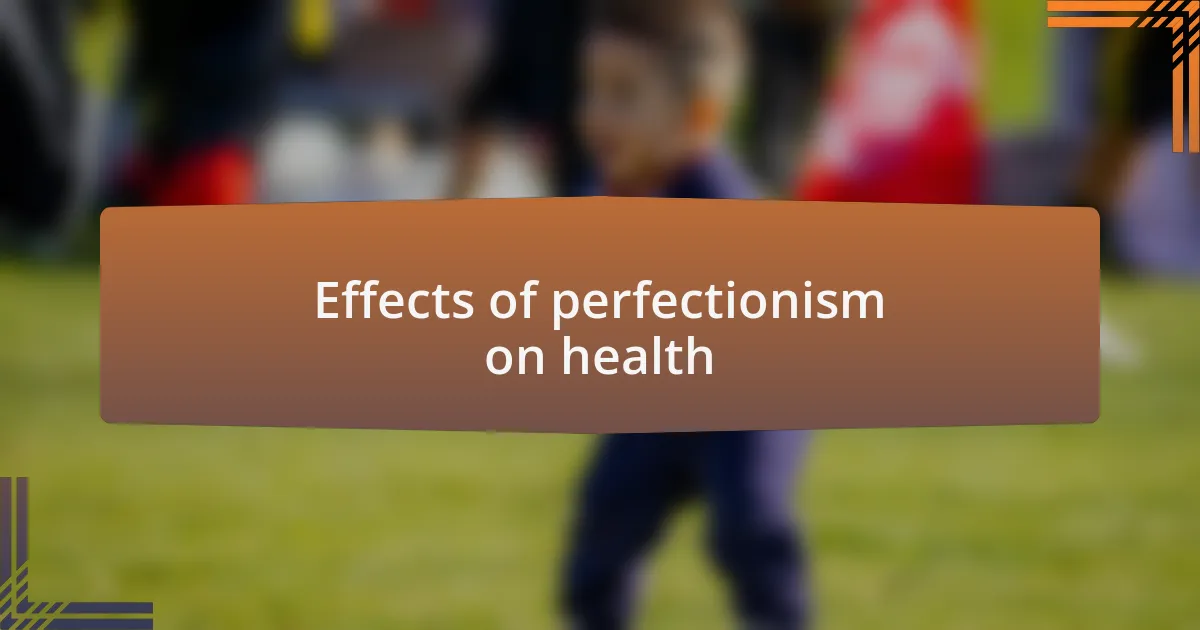
Effects of perfectionism on health
Perfectionism can significantly impact a child’s mental health, often leading to anxiety and depression. I recall a friend’s daughter, who insisted on being the best in her gymnastics class. After falling short during a competition, she spiraled into a deep sense of inadequacy, which not only affected her performance but also strained her relationships with friends. Isn’t it poignant to think how a child’s pursuit of flawlessness can overshadow their childhood joys?
Moreover, the physical health ramifications of perfectionism cannot be overlooked. When children are overly focused on achieving the impossible, it manifests in stress-related symptoms like headaches and fatigue. I remember grappling with similar feelings during my high school years, where the pressure to maintain straight A’s resulted in sleepless nights. How do we help children channel their energy into healthy habits rather than allowing perfectionism to dictate their lives?
Ultimately, perfectionism can create a toxic cycle—leading to burnout and disengagement. From my own observations, children caught in this cycle often become disheartened and reluctant to try new things, fearing they won’t excel. This fear not only stifles their potential but also robs them of valuable life experiences. Are we, as caregivers, equipping children to embrace the imperfect journey that life truly is?
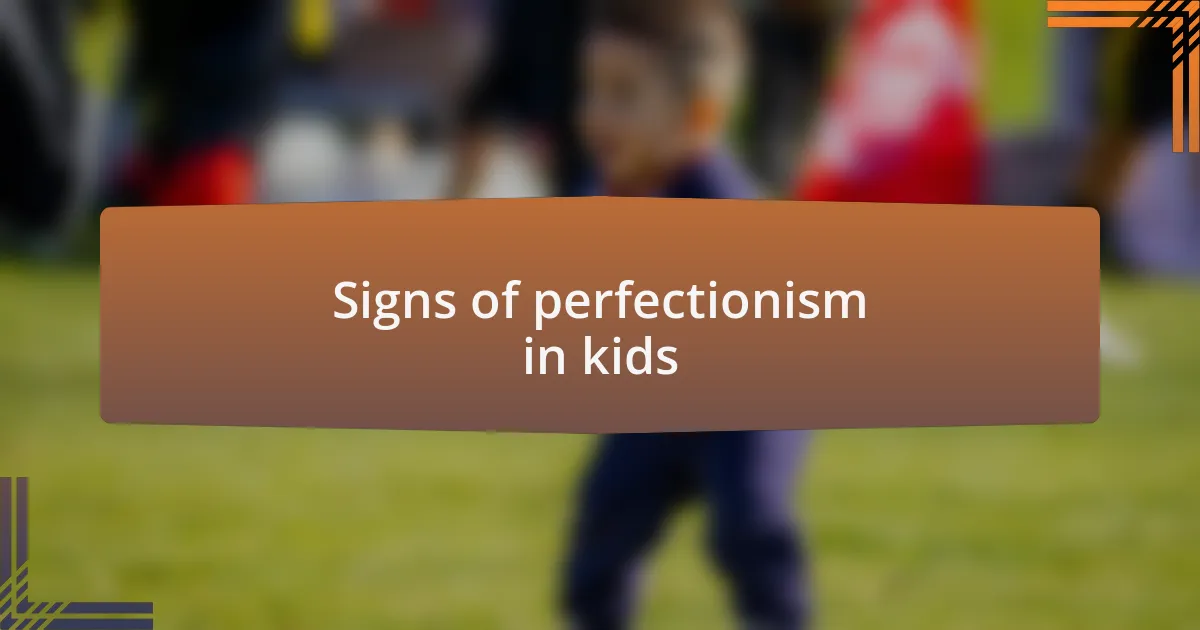
Signs of perfectionism in kids
When looking for signs of perfectionism in kids, one often sees an excessive preoccupation with making mistakes. I recall my nephew, who would spend hours redoing his art project until it was “just right.” It wasn’t just about the artwork; it reflected his fear of judgment and the pressure he felt to meet unattainable standards. Have you ever noticed a child becoming upset over minor errors? It can be heartbreaking to watch.
Another telltale sign is an intense reaction to feedback, even if it’s constructive. I remember helping a friend’s daughter with her homework, and she cried at the slightest hint that she could improve. Her emotional response made it clear that she believed any criticism was a reflection of her worth. It makes you wonder how deeply rooted these feelings can become and the toll they take on their self-esteem.
Additionally, perfectionist children often demonstrate an inability to enjoy their accomplishments. They might achieve a high grade but instead of celebrating, they dwell on what they could have done better. I’ve seen this in a young athlete who, after winning a race, obsessed over the fraction of a second she could have improved. It’s a grim reminder that striving for perfection can dim the bright sparks of joy and achievement that are essential to childhood. How can we help these kids refocus on the journey rather than the destination?
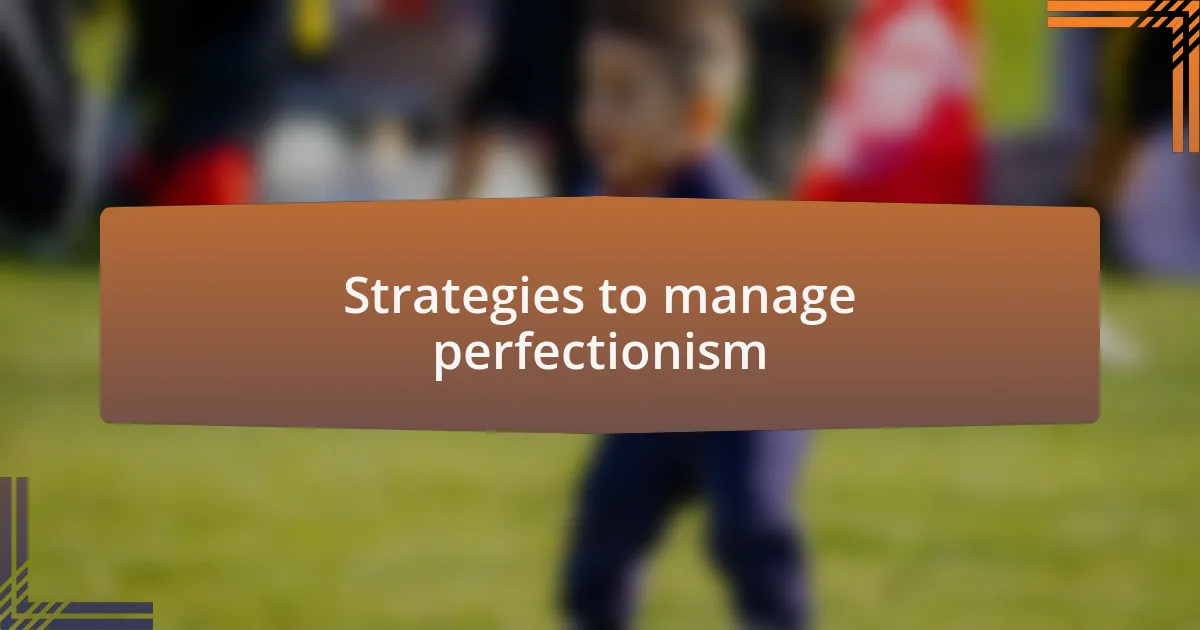
Strategies to manage perfectionism
One effective strategy I’ve found is to encourage children to set realistic goals. When I guided my niece in her school projects, I emphasized the importance of focusing on progress rather than perfection. This shift allowed her to celebrate small wins, reminding her that each small step is still a step forward. Have you seen how shifting the focus can alleviate pressure?
Another approach is to model vulnerability ourselves. I vividly remember sharing my own experiences of failure with a young mentee. I told her about the many times I stumbled in my career, emphasizing that each mistake was a lesson learned rather than an end. By doing this, I could see her gradually embrace her own errors, understanding they are a natural part of growth. Isn’t it refreshing when children see adults acknowledge imperfections?
Additionally, practice mindfulness techniques. When I introduced simple breathing exercises to a friend’s child who was overwhelmed during homework, I noticed a remarkable change. These moments of pause not only calmed her nerves but also helped her gain perspective on her tasks. It’s incredible how just a few deep breaths can shift a child’s mindset from one of fear to one of curiosity. How do you think practicing mindfulness could help kids in moments of stress?
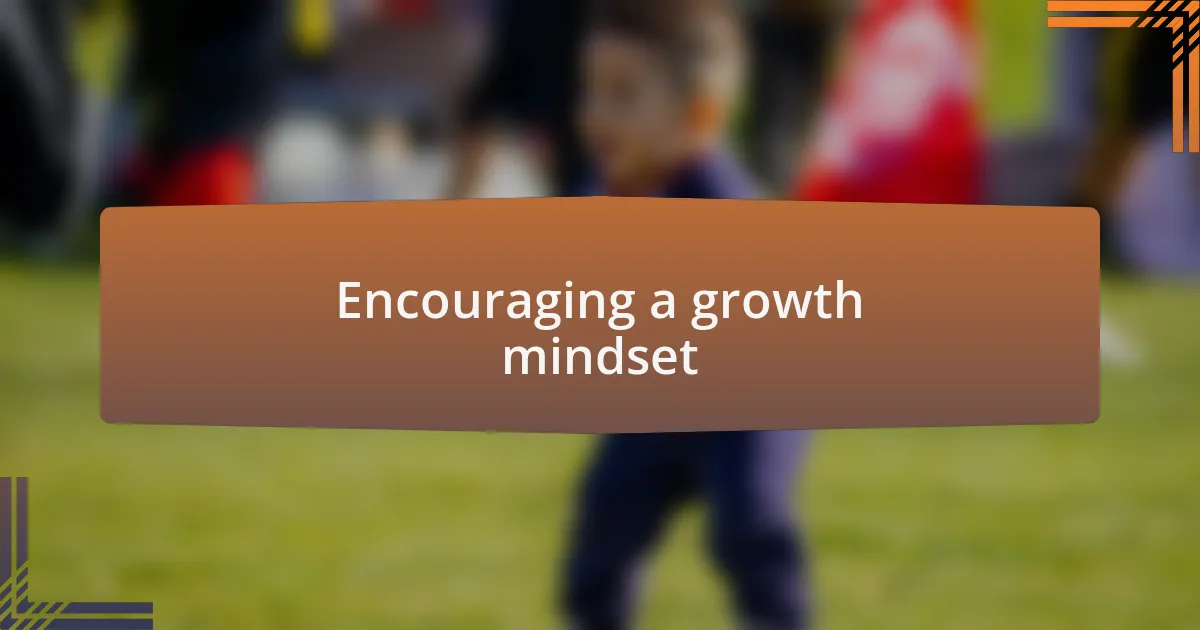
Encouraging a growth mindset
Encouraging a growth mindset starts with celebrating effort over outcomes. I recently observed my son, who often felt disheartened by his math tests. Rather than focusing on the score, I praised him for the time and dedication he invested in studying. This simple shift in conversation reinforced the idea that learning is a journey, and each bit of effort contributes to his development. Have you noticed how emphasizing the process can uplift a child’s spirit?
I often emphasize resilience as a cornerstone of a growth mindset. Last summer, I encouraged a small group of kids to try rock climbing for the first time. Many were hesitant or fearful of falling, but after each practice, I would ask them to reflect on what they learned rather than what they achieved. Watching them take pride in their perseverance was a joy. How rewarding is it to witness them embrace challenges with open hearts?
Moreover, fostering a safe space for curiosity and experimentation is vital. I remember when my daughter tried her hand at painting; she initially worried about it being perfect. I urged her to play with colors without the pressure of a final product. As she splashed paint on the canvas, I saw her joy bloom, and that moment crystallized why a growth mindset is essential. Don’t you think that by letting children explore freely, we empower them to discover their full potential?
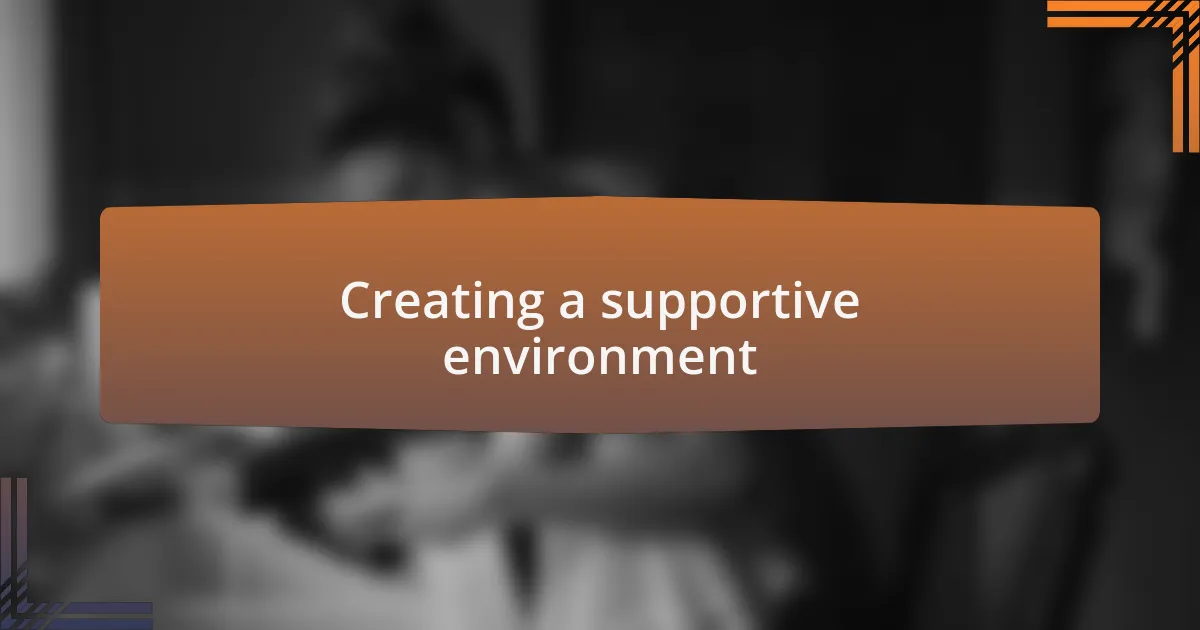
Creating a supportive environment
Creating a supportive environment is crucial for nurturing children, especially when they grapple with perfectionism. I recall a time when my son was frustrated about his artwork. Instead of critiquing the painting, I asked him about what he enjoyed while creating it. His face lit up as he talked about the colors he picked and the stories he wanted to tell through his art. It struck me then—by focusing on his experience, we shifted the conversation from perfecting a picture to enjoying creativity. Isn’t it amazing how a simple shift in focus can help a child feel more valued?
To truly foster a nurturing space, open communication is key. I remember having a heartfelt discussion with my daughter after she expressed anxiety over her dance recital. I encouraged her to share her feelings without fear of judgment. This openness not only reassured her but also built her confidence in voicing concerns. Have you experienced how sharing worries with someone who listens can sometimes lighten the burden?
Additionally, modeling healthy expectations can shape how children perceive their own abilities. I purposely share my own struggles with tasks, like when I attempted baking a challenging recipe. The cake didn’t rise as expected, but I laughed it off and emphasized how valuable the experience was. Watching me embrace my imperfections encouraged my kids to see that making mistakes is part of learning. Don’t you think that by normalizing struggles, we can help children feel more comfortable navigating their own?

Sharing personal experiences with perfectionism
Sharing my experiences with perfectionism has been a journey of self-discovery. I remember one particular moment when I was preparing for a big presentation at work. I spent hours tweaking every slide, striving for an unattainable level of perfection. In the end, I realized I had neglected my own well-being, feeling drained and overwhelmed. It dawned on me that the desire for perfection often leads to unnecessary stress and that sometimes, simply doing my best is more than enough.
Another time, I faced my perfectionist tendencies while volunteering at a local children’s health fair. I meticulously planned every detail, from the layout to the materials. However, when the day arrived, things didn’t go as smoothly as I envisioned. Instead of spiraling into frustration, I chose to embrace the chaos. I engaged with families, even laughing off the minor mishaps. This experience taught me the importance of adapting and prioritizing connection over flawlessness. Have you ever found that letting go of rigid expectations can cultivate joy in unexpected ways?
Reflecting on my perfectionism isn’t always easy, but it’s crucial for growth. I recall a moment when my daughter had trouble with a school project. I could see the fear in her eyes of not meeting her own high standards. I shared my own struggles from school, emphasizing that no one is perfect and that we all have areas where we stumble. Seeing her relief was profound; it reminded me that vulnerability creates a bridge toward understanding and support. Together, we discovered that perfection is overrated, and it’s our journey, not our destination, that truly matters.